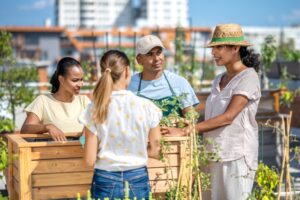 Foraging. It is a term that typically conjures up images of living in a remote cabin in the forests. However, foraging is not restricted to persons with acres of land. It is also feasible to forage in cities and suburbs! This article will discuss urban and suburban foraging, its legality, and how to get started in your local community.
Foraging. It is a term that typically conjures up images of living in a remote cabin in the forests. However, foraging is not restricted to persons with acres of land. It is also feasible to forage in cities and suburbs! This article will discuss urban and suburban foraging, its legality, and how to get started in your local community.
What is Urban Foraging?
The process of collecting wild plants and mushrooms that flourish in your local surroundings is known as urban foraging. Many of these plants have medicinal or edible properties. Dandelions in your neighborhood park, for instance, can be consumed, whereas acorns from trees throughout the city can be toasted or ground into flour.
Foraging is gaining popularity among youthful TikTok influencers and followers. Foraging videos such as this one have received more than 72 million views, and numerous individuals have adopted the technique as a means of supplementing their diets. Then why not? Foraging is a great way to learn about nature and become familiar with your environment. You may also be able to carry home wild foods that have not been treated with herbicides or pesticides.
Is Urban Foraging Legal?
In most regions, it is permissible to harvest vegetation, fruits, nuts, and wild mushrooms from public land. This typically includes parks, sidewalks and walkways, the grounds surrounding municipal buildings, riverbanks and creeks, and other public access areas in urban or suburban settings. You can also use maps like the one provided by FallingFruit.org to help find foraging spots in your area. However, you should always examine local laws and property records. In certain locations, certain urban foraging activities may be restricted or prohibited.
Additionally, you should not transgress on private property unless you have the owner’s permission. Some property owners may allow you to harvest fruit, nuts, and other items from their land if you inquire first. You may find that your neighbors and other nearby property owners have excess produce that they are willing to share.
How to Begin
Foraging in cities can be an interesting and rewarding activity. To begin, go online or chat to local gardeners, wild food lovers, or botanists about what plants are native to your region. Consider taking a plant identification class or joining a local outdoor club to learn more about the plants you could see in your area.
It is essential to practice ethical harvesting methods that respect the environment and other people who may be using the land when you venture out. Never take more than necessary for your own use, unless it is given to you for free and you intend to share it with others.
You may also wish to invest in some basic foraging equipment, such as a basket or reusable bag, paper bags (note that plastic will make mushrooms slimy), pruning shears or a small knife, and small containers to keep your foraged plants separate and prevent things from being crushed.
Avoid harvesting in regions that have been treated with chemical pesticides or fertilizers. For instance, regions near heavy traffic or sources of agricultural effluent, such as farm fields, orchards, and factories, are susceptible to chemical contamination. The same holds true for golf courses and other pesticide-treated lawns. Inquire with the landowner or local authorities if you are unsure if an area has been treated. Before consuming any wild edibles, you should always thoroughly cleanse and prepare them.
Foraging is a fantastic way to connect with nature, discover native plants, and even obtain free sustenance! Now that you understand how to begin, you can forage in your own city or suburb. Who knows, perhaps you will discover a forager’s utopia in your own backyard!
Are you planning a move? Contact your local Real Property Management office to view listings for quality rental properties in your area.
We are pledged to the letter and spirit of U.S. policy for the achievement of equal housing opportunity throughout the Nation. See Equal Housing Opportunity Statement for more information.


